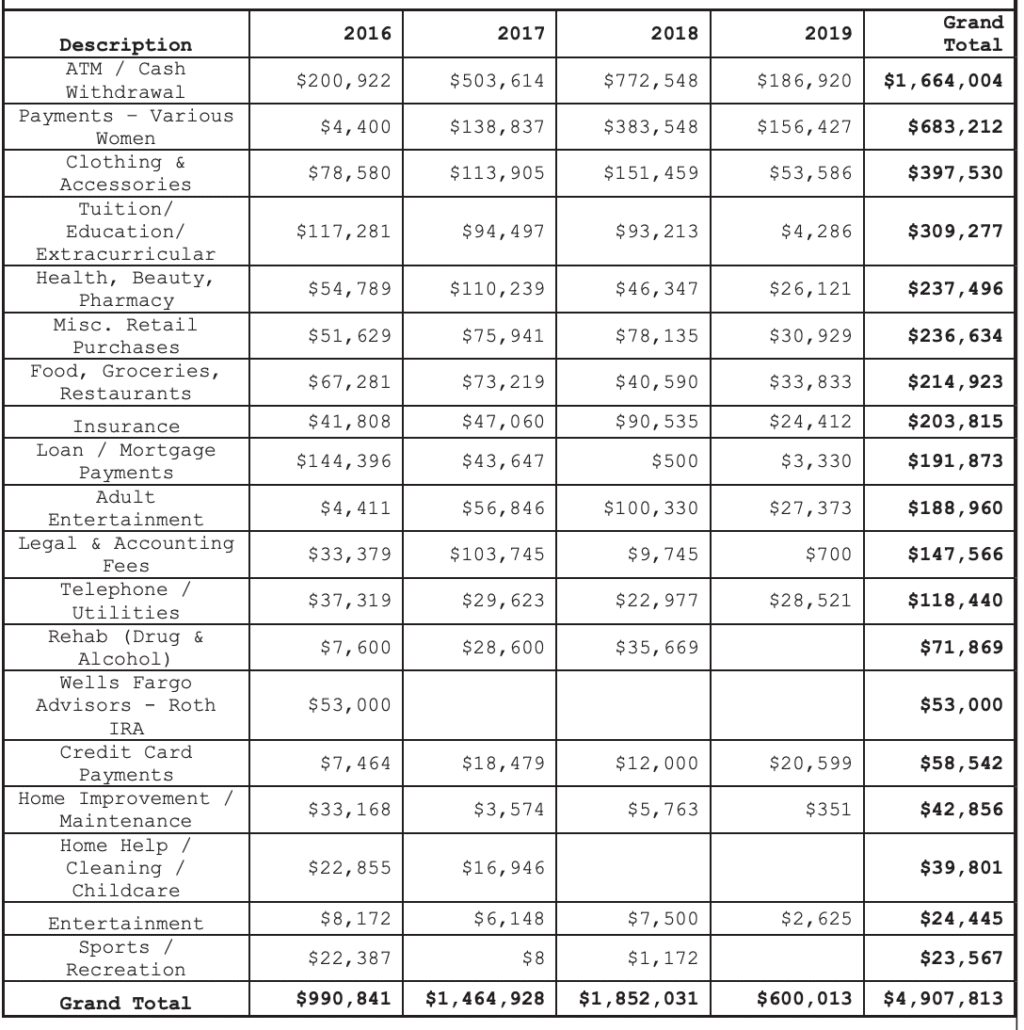The August 13 Venmo Charge David Weiss Claimed Was an August 14 Charge
My very first attempt to fact check one of the claims David Weiss made in the tax indictment of Hunter Biden the other day found what is almost certainly an error — and that’s before other reliability problems with the claims Weiss will face if this ever goes to trial.
But first, I probably owe Hunter Biden (and Katie Dodge, his long-suffering personal assistant during the period of his worst addiction) an apology.
In the indictment, Weiss included this eye-popping table that — he claims — captures Hunter’s spending in the years he charged.
There’s a conceptual problem with the table in any case. He’s showing the years for which he charged Hunter for — at a minimum — not paying his taxes. And while it’s true that if you’re self-employed you’re supposed to make estimated payments during the tax year, many many many people do not. Not paying usually only becomes a problem in the following year, when the taxes are due. Hunter’s alleged crimes occurred starting in 2017, not 2016.
So Weiss should show the income and expenses Hunter had in the following years — the years in which Hunter was legally obligated to pay the taxes. But if Weiss had shifted this table by one year, to show what Hunter was spending out-of-pocket in 2020, he would have had to reveal that in the year Hunter tried to clean up the wreck that he had made of his life in the past four years, he really didn’t have the income to pay those taxes. Weiss makes much of the fact that Kevin Morris paid for certain things in 2020 (probably including alimony and child support), some of that — possibly including the house in Venice where, in a recent podcast with Moby, Hunter describes he was hiding out from right wing mobs ginned up by Fox News — may not have been cash.
The reason I owe an apology, however, is that I assumed that the category, “Payments — Various Women,” meant those were sex workers.
To take this to trial, Hunter Biden has to be willing to let a paparazzi press spend valuable campaign reporting time on how a person can spend $383,548 on sex workers and $100,330 on adult entertainment in one year, 2018. It risks making the 2024 campaign precisely what Rudy Giuliani intended the 2020 one to be.
Then I started thinking about the way Hunter paid actual sex workers — often by Venmo or bank transfer and sometimes even by check — and I realized at least some of that would be captured in an even bigger number (which undoubtedly also reflects drug purchases) of ATM withdrawals: $772,548.
Then it occurred that that “payments — various women” may include to the four women Hunter paid from Owasco funds in 2018, including Dodge, Lunden Roberts, and these two people (who are not otherwise included in the table):
b. Person 2 is someone with whom the Defendant had a romantic relationship and who did no work, nor was she expected to do any work for Owasco, PC. The Defendant placed Person 2 on payroll in Spring 2018 in order to provide her with health insurance. In addition to health insurance, Person 2 received $11,000 in wages, which the Defendant falsely claimed as a business deduction reducing the income to him from Owasco, PC and his individual income taxes.
c. The Defendant placed Person 3 on payroll in spring 2018. Person 3 was a family member of Person 2’s. Person 3 received $11,000 in wages which the Defendant falsely claimed as a business deduction reducing the income to him from Owasco, PC and his individual income taxes. Prior to being placed on payroll, Person 3 had assisted the Defendant with personal errands and some light clerical work. After being placed on payroll, Person 3 did not perform any work-related services.
As I mentioned, Dodge worked her ass off in this period trying to keep Hunter afloat, including contacts with Burisma. I can imagine that an accountant would advise that treating her as payroll was perfectly acceptable. Yet if I’m right about how Weiss allocated this spending, he has insinuated by referring to this category by gender that Dodge, along with the others, was just a sex worker — exacerbating Joseph Ziegler’s labeling of Roberts as a prostitute in his House Ways and Means testimony.
Plus, if you had a personal assistant category, there should be one for the male Keith Ablow associate who in 2019 declared himself Hunter’s Chief of Staff, asked for income twice what Dodge was getting, and at least attempted to take over Hunter’s life, bank accounts, and rolodex. But he’s male and looking too closely at what he was doing when Hunter Biden’s digital life was packed up on a laptop that would eventually make its way to the FBI would raise a lot of questions and so … he doesn’t obviously appear here.
Then there are what Weiss has billed as ATM/Cash Withdrawals, that $772,548 figure. I’m virtually certain that’s wrong and also misnamed. It’s misnamed because we can see Hunter’s ATM withdrawals from Wells Fargo in publicly released data, and while there are days when he was obviously standing outside of an ATM making four $300 withdrawals in a row, that didn’t happen every day. It’s wrong because the credit card payments are almost certainly vastly higher than the curiously round $12,000. And it’s wrong or misnamed because a lot of that would be bank transfers and other kinds of payment, like Uber or Venmo.
Which brings me to the very first expense included in the indictment that I checked (there is at least one other to which I’ll return): a $1,500 Venmo payment to an exotic dancer, which Weiss described this way:
A $1,500 Venmo payment on August 14, 2018. That payment was to an exotic dancer, at a strip club. The Defendant described the payment in the Venmo transaction as for “artwork.” The exotic dancer had not sold him any artwork.
Per files available at BidenLaptopEmails dot com, here’s what that Venmo charge looks like:
Not only is there no way for someone who made this payment in the depths of his addiction to recognize, over a year later, that this woman is an exotic dancer, but Weiss got the date wrong. Venmo records the payment as being made on August 13, 2018 (though the payment may have cleared the next day).
Sure, getting a date wrong by one day in an indictment charging three felonies for making errors on paperwork is not that big of a problem — good enough for government work, they say.
Except it actually is a big deal that Weiss got that date wrong.
The reason I was immediately interested in that payment is because it occurred just days after the day, August 6, 2018, when someone or someones added two new remembered devices to Hunter’s Venmo account 12 minutes apart.
The thing is, it’s distinctly probable that at least one of the devices added to Hunter’s Venmo account was not added by Hunter. That’s because one of those newly added devices — an iPhone added at 15:26 — was located in Flintridge, CA, the foothills north of Pasadena. The other of those newly added devices — also an iPhone, the one added at 15:38 — was located near Las Vegas. According to Gus Dimitrelos’ report, Hunter hadn’t added a new iPhone to his Apple account for months — not since January 21, 2018.
Hunter was doing some crazy things at that point in his life, but getting from Los Angeles to Las Vegas in 12 minutes was probably beyond even the craziest driving; even commercial flights take over an hour.
This is precisely the phone metadata that, I noted, should have led law enforcement officers looking closely, as the IRS has been doing ever since 2018, to raise alarms about whether Joe Biden’s son, at a time when he was obviously hanging out with sex workers and drug dealers, was also having his digital life taken over.
The problem with indicting Hunter Biden for things that were paid through his devices is that — as the same book that Weiss uses to validate the fact that Hunter didn’t work at all in 2018 describes — often, after he engaged in a transaction with some other addict, his watch or jacket or iPad disappeared.
Somebody would eventually come over to my room to sell me something directly, or pass along a connection, for a finder’s fee. When we finished the transaction, the addict was usually out the door before I realized I was missing my watch or jacket or iPad—happened all the time.
“Happened all the time.”
If Hunter’s devices walked away “all the time,” then any payment made through them — certainly any payment made immediately after his Venmo account added two new remembered devices in two different cities 12 minutes apart — would have to be validated individually, to make sure someone else wasn’t making the payment, or at least to make sure Hunter didn’t think he was paying $500 for something but instead getting charged $3,000, which if he remembered it years later he would remember as something else.
“Happened all the time,” I can imagine.
But if you validate an individual Venmo payment adequately enough to be sure Hunter actually paid for it and entered the transaction category as “artwork” himself, then you’re going to get the date right.
And on this payment, in an indictment charging a three felonies for false filings to the Federal government, David Weiss didn’t get the date right.
Update: I have asked both David Weiss’ spox and Abbe Lowell whether they have clarity about the actual date of this payment. I have gotten no response from Lowell and Weiss’ spox has not yet gotten back to me with an answer.
Update: Weiss’ spox “decline[d] to comment beyond the indictment.”


